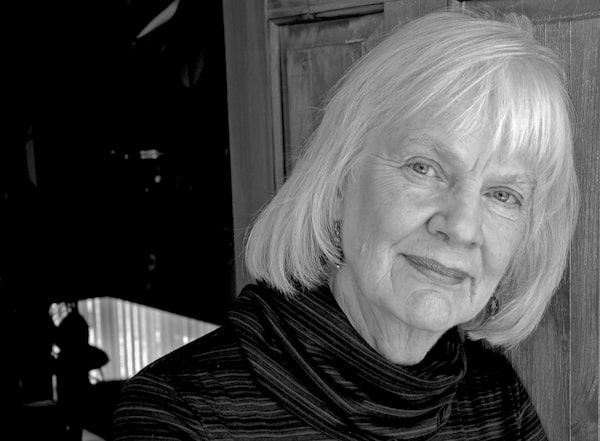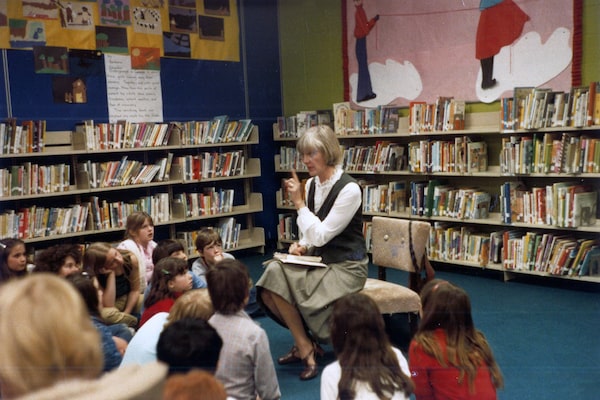
Author Joan Clark had 'her nose in a book all the time' growing up, her sister recalled. Clark died at age 88.Ned Pratt/Courtesy of the Family
She was a writer with a free-flowing imagination who could spin a complex tale out of a minuscule scrap of information. Captivated by the magic of fiction from a young age, Joan Clark was a sharp observer of the nooks and crannies of human character, able to write with equal success for both children and grown-ups.
Of her 17 books, 10 were written for children and seven for adults, and she was nominated for or won prizes in both categories. Her bestselling title for young readers, according to her literary agent Dean Cooke, was The Hand of Robin Squires (1977), about a search for buried treasure on Oak Island in Nova Scotia; it sold more than 100,000 copies. Of adult titles, Latitudes of Melt (published in 2000) proved most enduring with about 30,000 copies sold – a high number in Canada’s small market. Her books were also translated into French, German, Swedish and Danish.
“She was a huge part of Canadian fiction,” said Ross Leckie, now a retired literature professor from the University of New Brunswick in Fredericton, where Ms. Clark was a writer-in-residence in 2015. “She is one of the great underrated Canadian novelists.”
Ms. Clark died on April 11 in a Calgary care home, aged 88. She had been struggling with Alzheimer’s disease since her early 80s.
She was born Oct. 12, 1934, as Florence Joan MacDonald, in Liverpool, N.S., the second of two daughters of William MacDonald and Sara MacDonald (nee Dodge). Her father worked variously as a coal distributor, a manufacturer and a real-estate agent; her mother was a nurse before having children.
In an interview, Ms. Clark’s sister, Gail Crawford, recalled that “Joan had her nose in a book all the time” when they were growing up.
The future author’s childhood memories included the outbreak of the Second World War and the Battle of the Atlantic – some of which was visible or audible from her seaside town. “It was 18 months of fighting while the Germans tried to sink our boats,” Ms. Crawford said. Of the brave young sailors billeted in her parents’ home or invited for Sunday supper, many would not survive.
Ms. Clark later recalled this tense period in War Stories, included in her 1990 short-story collection Swimming Toward the Light.
The MacDonald family moved to Sussex, N.B., and Joan enrolled at Acadia University, taking a degree in English drama. Both sisters loved the theatre.
At Acadia one day she and Jack Clark accidentally collided while rushing to their classes, sending books and papers flying. He was an outstanding athlete (track, basketball, rugby) working on his bachelor of science, the first step toward becoming a civil engineer. Back in her dorm, Joan told a friend that she had just met her future husband.
They married in 1958 and moved to Winisk, a small Cree community on the shore of Hudson Bay, where Mr. Clark worked setting up a station of the Distant Early Warning Line, Canada’s northern defence system. She found a garden shed beside a priest’s house, and it was to there she retreated to teach herself to write, setting down her observations about the community and the land. She kept these notes for almost three decades until, in the spring of 1986, Winisk was washed away in a flood with considerable loss of life, and the remaining residents were forced to move.

Joan Clark wrote 10 books for children. Her first book for young readers, Girl of the Rockies, was published in 1968.Courtesy of the Family
By then Ms. Clark, who was no longer living in the community, was well known as a children’s author. The old notes provided the basis for her first novel for adults, The Victory of Geraldine Gull (1988), with the flood providing the story’s climax. The title character is a hard-drinking Cree woman whose anti-social behaviour masks the pain of having lost her beloved artist son.
The book was a finalist for a Governor-General’s Literary Award for fiction, and won the fiction prize given by the Canadian Authors Association. In 1991 she received the Marian Engel award for a woman writer in mid-career.
After leaving Winisk, the Clarks settled in Edmonton, where Ms. Clark earned a master’s degree in education and taught high school for a time. They left for Calgary in the mid 1960s, where their sons, Tim and Tony, and daughter, Sara, were born.
While the children napped, Ms. Clark wrote longhand at the kitchen table. Her first book for young readers, Girl of the Rockies, was published in 1968 and told the story of a girl who cares for an orphaned bear cub, then lets it go. Eventually, her children’s books were honoured with a Vicky Metcalf award, and a Geoffrey Bilson prize for children’s literature.
In Calgary she was welcomed into a group of local authors who encouraged one another. In 1975, with poet and short-story writer Edna Alford, she co-founded Dandelion, Alberta’s only literary magazine at the time, which continued to publish until 2011. She was also a founding member of the Writers’ Guild of Alberta in 1980, and became the organization’s second president, after Rudy Wiebe.
“Joan quickly became a member of a writing community wherever she resided. If there wasn’t one, she set about forming one, attracting other women writers,” recalled her friend Bob Oxley. “She had a deep belief in community. She cared about others. The writer community gave her support and the chance to support others.”
Meanwhile, Mr. Clark’s reputation as a scientist and engineer grew; he became the country’s leading expert on permafrost and resource extraction in cold places. In 1984, when Memorial University in St. John’s appointed him president and chief executive officer of its new Centre for Cold Ocean Resources Engineering (C-CORE), the Clarks decided to return to their home region.
The next 30 years were highly productive for Ms. Clark, giving rise to her most ambitious work. This included two short-story collections, the Viking-themed historical novel Eiriksdottir, An Audience of Chairs, which was made into a movie, and the haunting Latitudes of Melt (the title refers to the latitudes where icebergs floating down from the Arctic begin to dissolve).
Latitudes has an enchanting heroine, Aurora, who was found by fishermen as a baby floating in a basket in 1912 shortly after the Titanic went down. The book traces Aurora’s life in Newfoundland till her death in 1985, when the wreck of the infamous ocean liner is finally located on the sea bottom and the mystery of Aurora’s parentage is solved. The sea and its dangers are artfully baked into the novel.
Ms. Clark’s last novel, The Birthday Lunch, published when she was 80, is the lightly fictionalized story of her mother’s death in Sussex, N.B., when Sara MacDonald was hit by a truck in front of a popular ice cream parlour. “The truck had a teenage driver and he was never charged,” recalled Ms. Clark’s sister. “We were angry and bitter about that.”
Ms. Clark received many late-in-life honours, including honourary degrees from her alma mater Acadia in 1999 and Sir Wilfred Grenfell College in Cornerbrook, Nfld., in 1998. At her death, Memorial University flew its flag at half mast.
True to form, Ms. Clark was also a founding member of the Writers’ Alliance of Newfoundland and Labrador, and twice won the province’s Winterset prize for her books.
Both she and her husband were inducted into the Order of Canada, one of the rare married couples to both receive this award.
“Joan and Jack, Jack and Joan, it was hard to think of one without the other. They were a power couple, not in the flashy sense but quietly,” Mr. Oxley said.
Jack Clark died of kidney failure in 2010. Ms Clark herself nursed him in his last years. She lived alone for a time, before moving to Calgary in 2017 to be closer to her family.
Joan Clark was predeceased by her husband of 52 years, Jack Clark, and leaves her sister, Gail Crawford; daughter, Sara; sons, Tim and Tony; and five grandchildren.